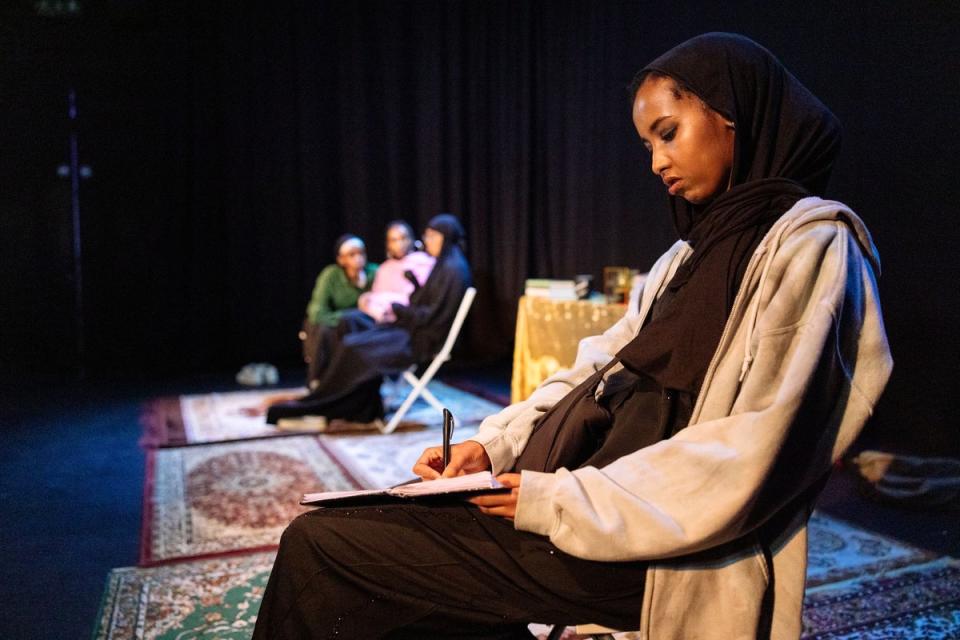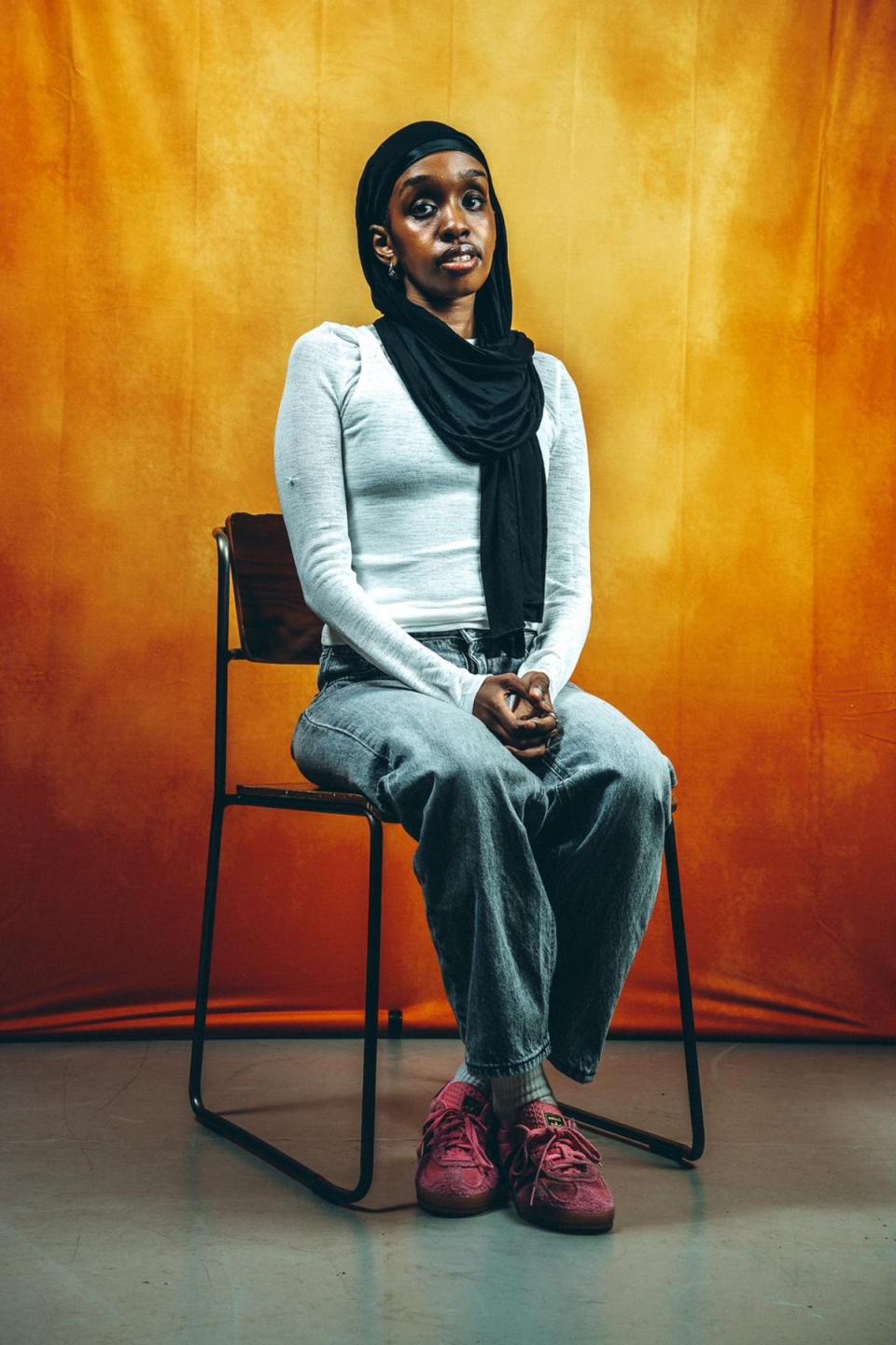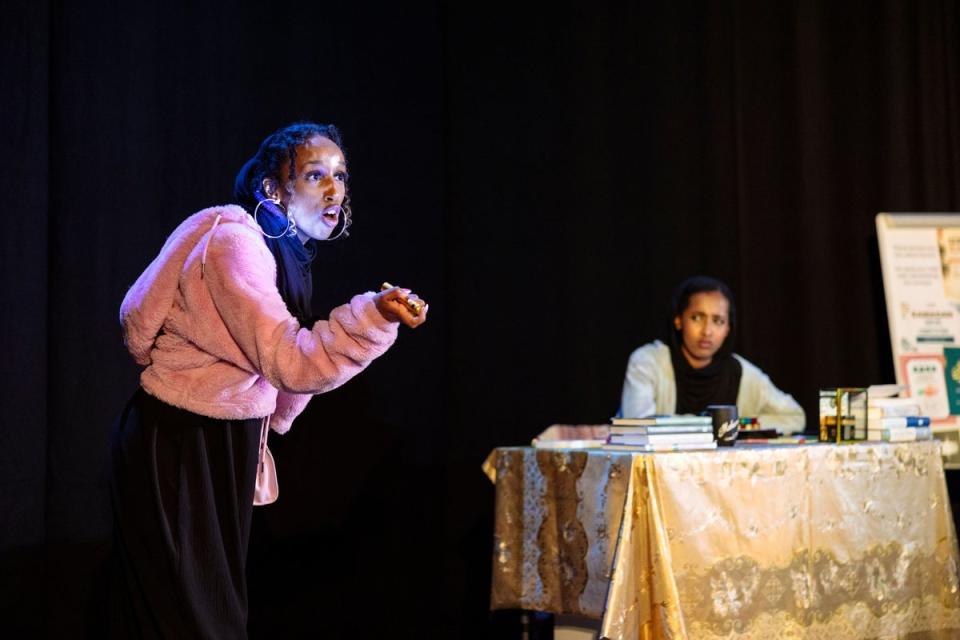There’s something nostalgic for British Somalis about the hit play Dugsi Dayz, which opens at the Royal Court Theater this week.
It reminds us of childhood afternoons spent sitting cross-legged on carpeted mosque floors, sneaking snacks and frantically trying to remember our Quran recitation.
Sabrina Ali’s show, which has had several successful performances including in Edinburgh, looks at those times through the lens of 1980s comedy The Breakfast Club. It perfectly captures the fun and often chaotic atmosphere of dugsi, the British Somali term for religious schools.
In the UK, children from the age of six to their late teens attend classes, often in a mosque, with others from across their community, learning about Islam, Arabic and reading the Quran.
Ali, who also starred in the series, said, “Everyone has a funny wedding story. If you talk to any Somali from Millennials or Gen Z about dugsi, they will have a story to tell you. “I wanted to write something that people could come and watch and reminisce about.”
It’s a raw and perfectly detailed portrayal of female friendship and Somali Muslim culture, told through four friends: Salma, Munira, Yasmin and Hani, who find themselves trapped in a dugsi detention center for an afternoon. They joke around, their conversations are layered with cultural references, and they reveal intimate secrets.

“I love the idea of confining people to one space and exploring archetypes. “I wanted to explore the main archetypes of Somali girls.” Ali says.
“You have four girls who come from completely different worlds and they are forced to interact. “They are not seen with each other in any other aspect of life, but in that detention they discover that they have many common experiences.”
First performing at Rich Mix in east London, Dugsi Dayz went on to embark on sold-out national tours and an award-winning run at the Edinburgh Fringe Festival. Now he is coming to the Royal Palace for the fourth time.
“The title sold itself, showing how eager our community was to see a show like this,” says Hannah Abdule, producer and co-founder of Side eYe Productions.
“It’s a pretty universal experience for anyone who grew up in the inner city, in London or in inner-city places in the UK, to say, ‘Yeah, it’s like that’s what our parents did to ground us in our faith.’ ‘ It resonated with many Muslim audiences from different backgrounds,” he adds.
Dugsi Dayz is unapologetically Somali; characters make references to Somali folklore and occasionally add Somali expressions. It was a liberating feeling for Ali to write for a specific audience without considering cultural nuances.
“I’ve watched a lot of shows that belong to a completely different world than mine. So I was able to understand and understand these nuances. And I think I really underestimated the intelligence of the audience,” says Ali.
“We have all been a young girl at some point,” she adds, recalling an endearing moment when Dugsi Dayz was performed to an audience of older people who later talked cheerfully about the play.
Raised in south-west London by his parents, who emigrated from Somalia in the nineties, Ali has always considered acting on stage to be his passion. It was difficult to find suitable roles for her in an industry where black Muslim girls had little representation.
As her interest in theater grew at a young age, she became struck and concerned by the fact that girls who looked like her rarely realized their dreams of writing and performing for the stage.
Ali said that when he first went to the theater he stood out painfully. “For the first time, I thought, ‘Is theater a place that has a place for me?’ Because I would love to be on stage.”


In 2019, she made her acting debut in EV, which explored sisterhoods in a first-generation Somali family, and was soon followed by her first one-woman play, Muna Knowns It All, a twisty satire about a disastrous wedding. .
Ali’s work, including the success of Dugsi Dayz, was made possible with the joint help of Side eYe Productions and Kayd Somali Arts and Culture.
“Having Kayd behind us has been the reason we’ve accomplished literally everything we’ve done. They have almost become like our Arts Council,” says Abdule. Founded in 2019 as a small community of people who felt excluded by mainstream theatre, Side eYe tells the stories they think need to be told, amplified with the help of Kayd.
“Someone gave us a stage and we want to tell our stories,” adds Abdule.
The real success of the play lies in its careful and authentic portrayal of Muslim girls. Poor representation of Muslims has long been a problem. Although they make up only one percent of speaking characters in film and television, their characters are often entrenched in stereotypes.
They lack nuance and are reduced to the roles of either terrorists or the unfortunate, oppressed headscarved girl who needs to be saved not only from her culture but also her religion.
When it came to writing her characters, Ali says, “It was very easy for me because I was writing the girls I had met in my life, so it felt natural.
A lot of times, when people write Muslim characters, unless they’re Muslim themselves or from the same background, they make a lot of bigoted judgments about what our biggest insecurities are and what our biggest insecurities are. greatest fears.


“We’re just normal girls. We’re not chained by our religion.” She adds: “The hijab is not at the center of our story.”
For both Abdule and Ali, it is important that Side eYe’s featured work shows that “hijabis can exist freely and beautifully in stories.”
“None of us expected Dugsi Dayz to achieve this kind of success,” says Abdule. Part of its success is its representation both on stage and behind the scenes with a community of Somali actors, writers and producers.
“We were able to show that this was commercially viable, that a show like this could sell out, have a majority Muslim audience and still be considered successful,” says Abdule. “When we talk about representation. I think sometimes we think it’s representation for representation’s sake. But actually because great stories are told.”
But there is hesitation in “decision-making areas” that see telling black stories as a risk and worry about whether it will sell.
“When it comes to black stories, we often hear that we already have that story. “Let’s see next year,” says Ali. “There may be many other games that young Somali girls play and it won’t be like Dugsi Dayz because it’s so different. Really trust us that we can achieve this.”
However, progress is being made, albeit slowly. “There might not have been a place for me in the theater when I was 18, but now I go to shows like For Black Boys and Red Pitch and it feels surreal to see audiences that look like me. “It was never like this before,” says Ali.
“It’s a very sick time for black theater right now.”
Dugsi Dayz is at the Royal Court Theater and runs until May 18; royalcourttheatre.com